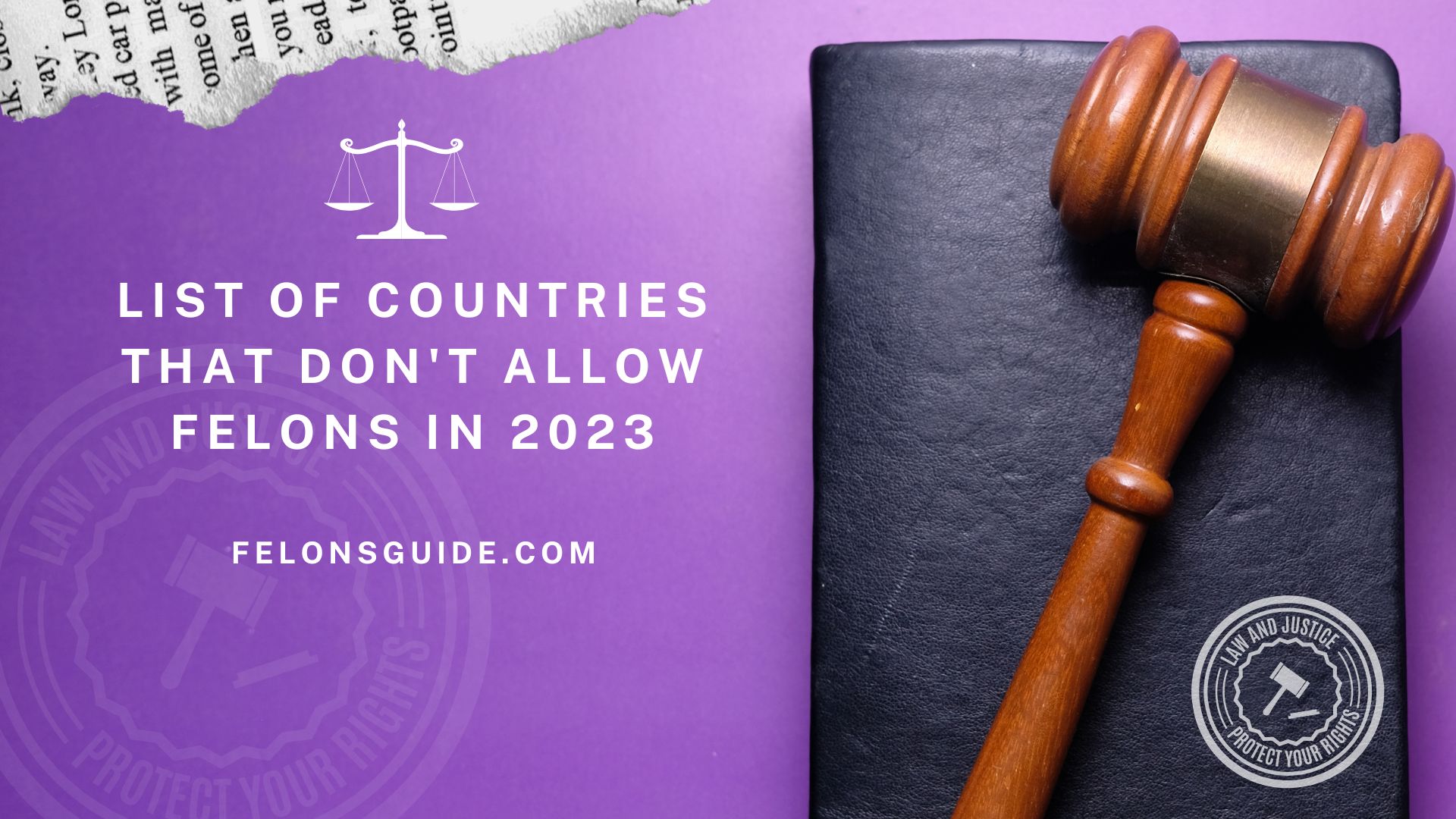Traveling abroad can be an exciting opportunity, but for individuals with a felony record, certain countries may not allow entry. Understanding which countries don’t allow felons is crucial for planning your trips and avoiding potential complications. This article will delve into the topic, providing you with detailed insights, regulations, and tips to navigate this complex issue.
Whether you're a felon planning a vacation or relocating for work, knowing the entry restrictions of various countries is essential. Many nations impose strict immigration policies that consider criminal records as grounds for denial. This guide aims to clarify these rules and help you make informed decisions.
This article will explore the countries that restrict felons, the reasons behind these policies, and potential alternatives for travel. By understanding the legal frameworks and visa requirements, you can better prepare yourself for international travel.
Read also:What Is A Crown Family Exploring The Royal Dynasty And Its Legacy
Table of Contents
- Countries That Don't Allow Felons
- Biographical Overview of Felony Restrictions
- Visa Requirements for Felons
- Legal Policies and Regulations
- Common Reasons for Entry Denial
- Exceptions and Waivers
- Travel Tips for Felons
- Data and Statistics
- Alternative Travel Destinations
- Conclusion
Countries That Don't Allow Felons
When it comes to international travel, felons face unique challenges due to immigration policies. Several countries have stringent rules regarding entry for individuals with a criminal record. Below is a list of some countries that don't allow felons:
United States
The U.S. has strict immigration laws, particularly for non-citizens with criminal records. Felons attempting to enter the country may face denial unless they obtain a waiver. The severity of the offense and its classification play a significant role in determining admissibility.
Canada
Canada is another country that doesn't allow felons without proper documentation. Individuals with a criminal record must apply for a Temporary Resident Permit or undergo Criminal Rehabilitation before entering the country.
Australia
Australia imposes character tests for visa applicants, which can disqualify felons. Crimes involving violence, drugs, or sexual offenses often result in visa rejections. Felons must demonstrate rehabilitation and provide supporting evidence to gain entry.
Biographical Overview of Felony Restrictions
Understanding the context of felony restrictions requires examining the historical and legal framework behind these policies. Below is a summary of key points:
| Country | Entry Restrictions | Waiver Options |
|---|---|---|
| United States | Strict for non-citizens with criminal records | Waiver available for certain offenses |
| Canada | Automatic denial for criminal convictions | Temporary Resident Permit or Criminal Rehabilitation |
| Australia | Character test for visa applicants | Rehabilitation documentation required |
Visa Requirements for Felons
Visa requirements vary by country, but felons must meet additional criteria to gain entry. Below are some common requirements:
Read also:What Responsibilities Do Crown Families Hold The Royal Duties Unveiled
- Proof of rehabilitation, such as completion of parole or probation
- Documentation of good behavior post-conviction
- Letters of recommendation from employers or community leaders
- Official waivers or permits granted by the destination country
Application Process
The application process for felons typically involves submitting detailed paperwork, including criminal records, court documents, and supporting evidence. It's essential to consult with legal experts to ensure compliance with immigration laws.
Legal Policies and Regulations
Legal policies regarding felons vary globally, with each country implementing its own set of rules. For instance:
United Kingdom
The UK evaluates each case individually, considering factors such as the nature of the crime, time elapsed since conviction, and rehabilitation efforts. Felons may still face entry denial, especially for serious offenses.
New Zealand
New Zealand conducts a character assessment for visa applicants, which includes reviewing criminal records. Felons may need to provide extensive documentation to prove they pose no threat to the community.
Common Reasons for Entry Denial
Entry denial for felons is often based on specific grounds, including:
- Crimes involving violence or terrorism
- Drug-related offenses
- Sexual crimes or exploitation
- Repeat offenses or patterns of criminal behavior
Understanding these reasons can help felons prepare accordingly and avoid potential issues during travel.
Exceptions and Waivers
While many countries don't allow felons outright, exceptions and waivers exist for certain cases. Below are some examples:
Temporary Resident Permit (TRP) in Canada
A TRP allows felons to enter Canada for a specific period, provided they have compelling reasons for travel. This permit is ideal for business trips, family emergencies, or medical needs.
Criminal Rehabilitation
Criminal Rehabilitation is a permanent solution for felons seeking long-term entry into Canada. It requires demonstrating significant rehabilitation and a low risk of reoffending.
Travel Tips for Felons
Planning international travel as a felon requires careful preparation. Here are some tips to ensure a smooth journey:
- Research destination country policies thoroughly
- Obtain necessary waivers or permits in advance
- Carry all required documentation, including court records and proof of rehabilitation
- Consult with legal experts or immigration attorneys for guidance
Data and Statistics
According to recent studies, approximately 20% of visa applications from felons are denied globally. The majority of rejections occur due to incomplete documentation or failure to disclose criminal records. Below are some key statistics:
- Canada: 70% of denied entries involve criminal convictions
- Australia: 40% of visa applicants with criminal records fail the character test
- United States: 30% of non-citizen felons require waivers for entry
Alternative Travel Destinations
While some countries don't allow felons, others have more lenient policies. Below are some alternative travel destinations:
Mexico
Mexico generally does not impose strict entry restrictions based on criminal records, making it a viable option for felons.
Caribbean Islands
Countries like Jamaica and the Bahamas have relatively relaxed immigration policies, allowing felons to visit without significant hurdles.
South America
Nations such as Brazil and Argentina rarely consider criminal records during visa applications, providing opportunities for travel.
Conclusion
Traveling as a felon requires understanding the complexities of international immigration policies. Countries that don't allow felons often have strict regulations in place, but exceptions and waivers can provide pathways for entry. By preparing adequately and following legal guidelines, felons can still explore the world safely and responsibly.
We encourage you to share this article with others who may benefit from the information. For more insights on travel and legal matters, explore our other articles and resources. Your feedback and questions are always welcome in the comments section below.


